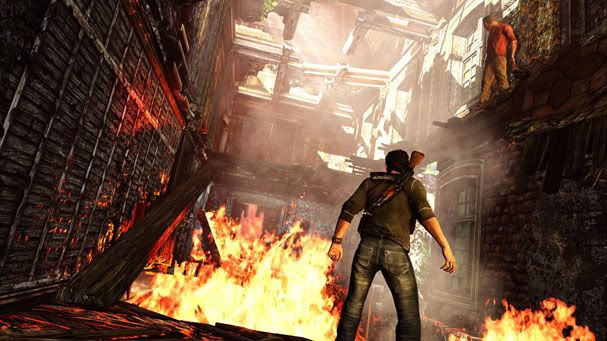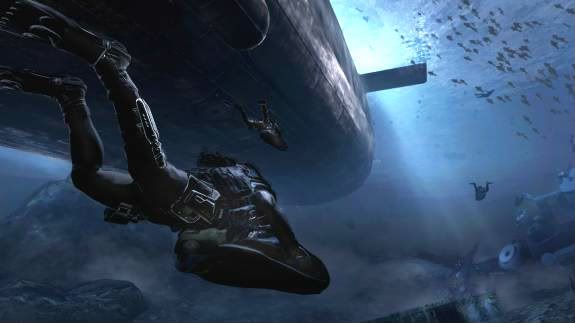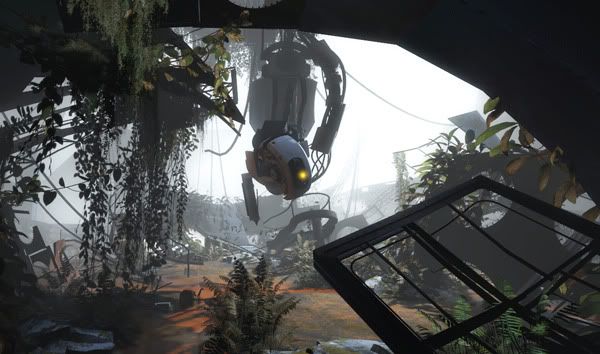This post has not been edited by the GamesBeat staff. Opinions by GamesBeat community writers do not necessarily reflect those of the staff.

Recent big releases like Uncharted 3: Drake's Deception and Call of Duty: Modern Warfare 3 have once again resurrected the discussion and criticism of today's super-scripted, theme-park brand of game design. I think these titles, along with others, prove that this type of approach can be done right. It's just that most games do it wrong.
I’ll be one of the first to tell you I hate experiences that take control away from the player so often. To be honest, I don’t even like quick-time events (except in brawlers for some reason). They're really just one step down from a cut-scene. Developers are trying to craft a dramatic story, but they know you need to feel like you're in control. Most fail at the latter.
I don’t hate the scripted-set-piece craze. I just think most studios handle the concept poorly, and I can count the ones on my hand that handle it well. If you want players to feel like they are directly affecting things while they are happening, then let them stay in control. I think the best way to do this is to influence events around the player. This is what Naughty Dog, Valve, and Infinity Ward have been very good at.
Uncharted 3’s scripting and set pieces are intuitive. The game won’t pan the camera over to the next platform, but it will make that platform the most interesting thing in the immediate environment. Sometimes the game might make you wonder what would happen if you went to a certain place to get you to go to there. Both the second and third games in the franchise did a good job of directing the player’s attention to where Naughty Dog wanted it to go instead of doing it forcefully.
I’ll admit that Uncharted 3 did have quite a few moments where I saw through the deception (no pun intended). Most of the time, when a ledge crumbled or a ladder broke off, I knew Drake wasn't in any real danger. Those issues are completely overshadowed, however, by how intelligent the scripting is compared to most releases.

I think that Call of Duty 4: Modern Warfare and Modern Warfare 3 are the only really good scripted war shooters. There are maybe three on-foot points throughout COD4 where the player doesn’t have full movement control. Other games in the series, like Call of Duty: Black Ops, and additional copycat releases had too many “you can only press THIS button for now” moments. That’s the kind of tackiness that I hate.
Instead, Call of Duty 4 had the script happening around the player most of the time. It almost treated the player as an actor in his or her own personal war movie. On paper, that sounds terrible, but in this particular case, IW managed to script a pretty good interactive war epic with likable characters and not too much suspension of disbelief.
I think Infinity Ward remembered that same virtue for Modern Warfare 3's campaign. The key to making these scripted corridor shooters is that most developers miss that you have to keep surprising people. Games like Black Ops, Killzone 3, and Battlefield 3 let players get bored with flat or predictable set pieces that didn't really stand out. Gears of War 3 also had a good campaign because something new was always going on, giving you new situations or increasingly varied enemies. Like crafting a good interactive action movie or theme-park ride, it’s all in the pacing. If you do it well, you end up creating a roller coaster worth riding again.

Half-Life 2, its follow-up episodes, and the Portal games are perfect examples of guiding the player purely through level design and scripting. Never once do they grab control away from you when you should have it. Valve uses a lot of the same tricks as Naughty Dog, knowing when your field of vision will catch the next interesting event and how you will react to the situation.
Like Call of Duty, the Half-Life games allow the plot and dialogue to happen around the player while keeping him or her in control. Portal handles this almost perfectly by containing almost all of its narrative in the environment, including dialogue.
The dichotomy that game developers face when trying to write stories (or just plots to move things along) is understandably tough. They have to write a straight sequence of events within a dynamic medium. I don’t think their pursuit is doomed. They just need to learn that games are fundamentally different from movies and need to balance out their own way of conveying plots.
